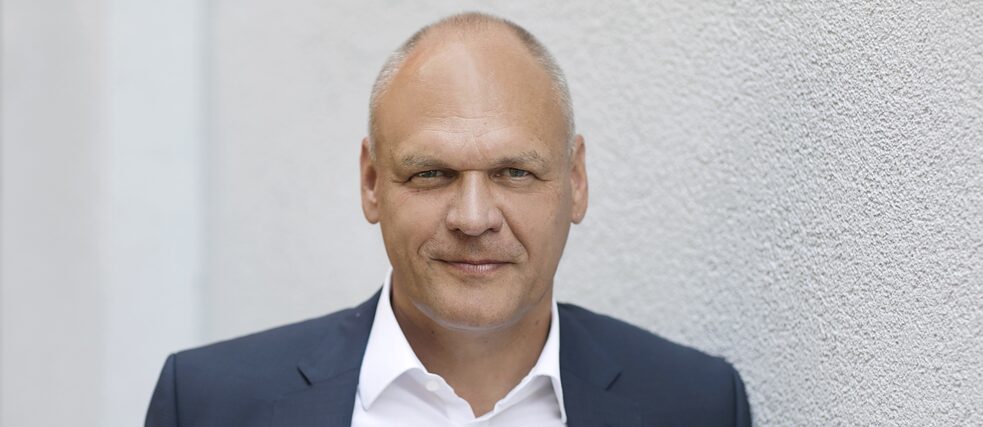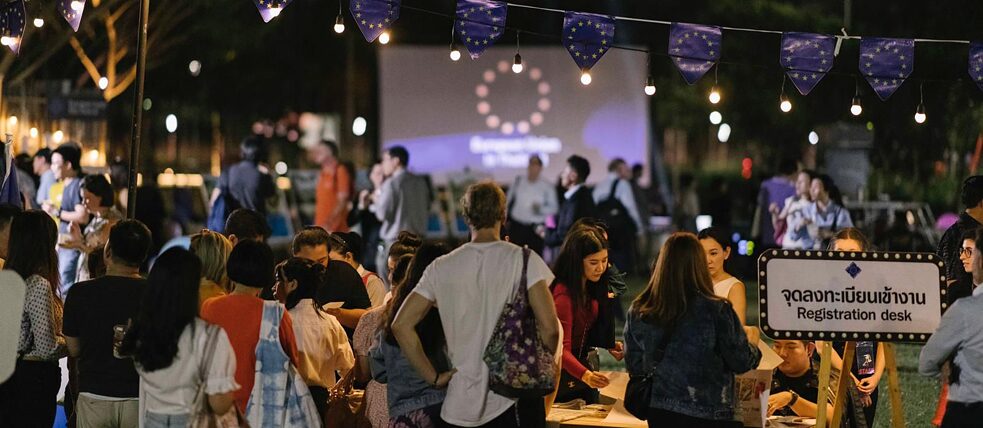Annual Report 2019/2020: Europe
Litmus Test for Europe

The Annual Report 2019/2020 of the Goethe-Institut is dedicated to Europe. In his editorial, Johannes Ebert, Secretary-General of the Goethe-Institut, speaks out in favour of solidarity and cultural and social networking – especially in times of the Corona pandemic.
Europe is in crisis. We’ve been hearing that for almost a decade. First, it was the European financial crisis that widened the gap between north and south. Then national governments and parties emerged that happily reap the benefits of the European Union, but, when it furthers their own national agendas, use populist slogans to make the EU out as the enemy. Finally, there’s the Brexit, the exhausting and lengthy exodus of a member state that is far from complete and will not be overcome for a long time.
And now we come to the pinnacle of the crisis peak: the coronavirus pandemic. The daily bulletins from the Robert Koch Institute and the human tragedies behind them are widely read like a negative tally of medals: who responded correctly within their national borders, who responded early enough, who did something wrong? We see closed borders, limits on personal freedoms for the sake of individual security, difficult discussions about easing restrictions. All of this is negotiated and decided at the national level because the mechanisms for solutions are anchored in national structures; in each country’s health policy, disease legislation, and internal security. The coronavirus crisis strengthens the national aspects of Europe.
European solidarity is only developing slowly. The EU is launching financing programmes in the hundreds of billions to support the countries hit by the coronavirus crisis. In coordinated actions, politicians are preparing for a Europe-wide recession. Again solidarity between the richer and poorer members will have to prove itself. This will keep us busy over the coming few years.
In view of such crises, the positive aspects of the EU often take a back seat: a longer peace than ever before on this continent, freedom of travel and movement, democratic systems, moderate but stable prosperity, educational opportunities far beyond one’s own borders. Even if the European Union has weaknesses, these are achievements that need to be defended and strengthened with all our might.
The Goethe-Institut has been one of the makers of the European network for almost 70 years. Advancing European integration and awareness of European citizenship while at the same time understanding Europe’s cultural diversity as a strength and using it for the development of our societies has been among our basic principles for many years. There are 52 Goethe-Instituts in Europe; the network is denser than on any other continent in the world. And these nodes continue to branch out, to look after cultural societies, to cooperate with museums, libraries, book fairs, and many other civil society and state institutions across Europe.
Thirteen years ago, the Goethe-Institut co-founded EUNIC, the association of the EU’s national cultural institutes; a network of networks as it were. In matters of culture and education, EUNIC has become an important partner of the EU, implements projects especially outside of Europe, and contributes to the European culture discussion. Just like More Europe, another network of cultural institutes and independent foundations dedicated to cultural cooperation in Europe.
All of these are always about promoting artists, strengthening mobility, and European cohesion, using the economic power of the creative industries, practicing European togetherness on a daily basis, and supporting freedom in civil society. Because art, culture, education, civil society – they all in their own way have the ability to think in networks beyond borders, to look at challenges in a different way, to open new access to solutions, to develop and test creative approaches. As the coronavirus crisis subsides we will need all of this more than ever when we face the opportunity and challenge of re-evaluating and redesigning democracy, society, or communication. And we cannot afford to make too many mistakes.
The basis for this is the ability to work together at a European level and to achieve good results in the cooperation, which – and this is important for Europe – is shared by us all on the basis of a common design process. Because Europe is more than a political, economic, and cultural project; Europe is also a very practice-oriented learning process, constant community practice.
 Preserving the quality of European film festivals is the aim of “Support to EU Film Festivals” | Photo (detail): Delegation of the European Union to Thailand/Korawut Neeparn
Preserving the quality of European film festivals is the aim of “Support to EU Film Festivals” | Photo (detail): Delegation of the European Union to Thailand/Korawut Neeparn
The Goethe-Institut has deliberately done this in recent years and actively pursued European cooperation, often supported by EU funds. The Goethe-Institut and its European partners are presently working on more than 40 such projects with a volume of over 20 million euros worldwide. For example “Support to EU Film Festivals”, in which, together with the Institut français and the Belgian film portal Cineuropa, we promote the professionalisation of European film festivals in third countries.
Other projects revolve around freedom of speech and sovereignty over data: What protects people from manipulation by fake news, cyberbullying, and hate speech? To strengthen media literacy in Russia, for example, the Goethe-Institut launched “The Earth Is Flat – How to Read Media”, which sensitises young people to being critical in the use of digital content and their own data on social networks. Or “Be Mobile – Create Together”, a Goethe-Institut programme with cross-border partners that aims to strengthen long-term exchange between the countries through artist residencies. Another initiative, “i-Portunus”, increases the mobility and networking of European artists in cooperation with Lithuanian, Ukrainian, and French partners through travel grants. It’s a sort of Erasmus programme for culture.
This year, the Goethe-Institut will also take advantage of this tried and tested European cooperation for the cultural programme of the German EU Council Presidency. The aim here is to think about the future of Europe with partners from culture, art, and civil society across all countries of the European Union and to master future challenges that have been emphasised by the coronavirus crisis: How can we make Europe ecological and sustainable? How do we take advantage of the opportunities and face the challenges of digitisation and artificial intelligence? How do we use a European memory and cross-generational narratives to arm ourselves against national populist tendencies? How do we experience the diversity of our European culture as an intellectual and emotional source of strength? How can we strengthen freedom in Europe? “#oekoropa”, “Generation A”, “Tell Me About Europe”, “The Disappearing Wall”, “European Kitchen”, “Earth Speakr” and “Freiraum” are the relevant initiatives that the Goethe-Institut and many partners are planning with the support of the Foreign Office. In this discussion of future issues, a European public will emerge that makes our common thoughts, feelings, and deeds visible and tangible across borders.
All of this will help promote European cooperation and solidarity. Cultural and social networking is the basis of the future of Europe. In this current crisis, it is more indispensable than ever. The Goethe-Institut will be passionately committed to this.
You can find the complete editorial “Litmus Test for Europe” by Johannes Ebert as well as exciting insights into the Goethe-Institut’s worldwide projects last year in the Annual Report 2019/2020.